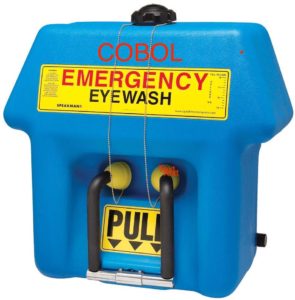I find COBOL level-88 declarations a bit confusing, which isn’t made any easier by usage that is probably wrong. Here’s an example from code that I was trying to step through in the debugger (anonymized):
WORKING-STORAGE SECTION.
01 data.
10 function-type PIC X(01).
88 option-a VALUE '1'.
88 option-b VALUE '2'.
88 option-c VALUE '3'.
88 option-d VALUE '4'.
With the use like so:
It’s my understanding that this is essentially equivalent to:
IF function-type = '1' AND function-type = '2' AND
function-type = '3'
NEXT SENTENCE ELSE GO TO meaningless-label-2.
Do I misunderstand the level-88 variables should be used, or is this just a plain old impossible-to-be-true if check? Putting this into a little sample program, confirms that we hit the ELSE:
IDENTIFICATION DIVISION.
PROGRAM-ID. TESTPROG.
ENVIRONMENT DIVISION.
CONFIGURATION SECTION.
DATA DIVISION.
WORKING-STORAGE SECTION.
01 data.
10 function-type PIC X(01).
88 option-a VALUE '1'.
88 option-b VALUE '2'.
88 option-c VALUE '3'.
88 option-d VALUE '4'.
PROCEDURE DIVISION.
move '1' to function-type
perform meaningless-label-1 thru meaningless-label-6
goback
.
meaningless-label-1.
* IF function-type = '1' AND function-type = '2' AND
* function-type = '3'
IF option-a AND option-b AND option-c
NEXT SENTENCE ELSE GO TO meaningless-label-2.
display 'IF was true.'
goto meaningless-label-6
.
meaningless-label-2.
display 'IF was not true.'
.
meaningless-label-6.
EXIT
.
I get SYSOUT of:
as I expected. If these were level-88 variables each “belonging” to a different variable, such as:
IDENTIFICATION DIVISION.
PROGRAM-ID. TESTPROG.
ENVIRONMENT DIVISION.
CONFIGURATION SECTION.
DATA DIVISION.
WORKING-STORAGE SECTION.
01 data.
10 blah PIC X(01).
88 blah-option-a VALUE '1'.
88 blah-option-b VALUE '2'.
10 foo PIC X(01).
88 foo-option-a VALUE '1'.
88 foo-option-b VALUE '2'.
88 foo-option-c VALUE '3'.
10 bar PIC X(01).
88 bar-option-c VALUE '3'.
88 bar-option-d VALUE '4'.
PROCEDURE DIVISION.
move '1' to blah
move '2' to foo
move '3' to bar
perform meaningless-label-1 thru meaningless-label-6
goback
.
meaningless-label-1.
IF blah-option-a AND foo-option-b AND bar-option-c
NEXT SENTENCE ELSE GO TO meaningless-label-2.
display 'IF was true.'
goto meaningless-label-6
.
meaningless-label-2.
display 'IF was not true.'
.
meaningless-label-6.
EXIT
.
This has the ‘IF was true’ SYSOUT. Perhaps the original coder meant to use OR instead of AND?
